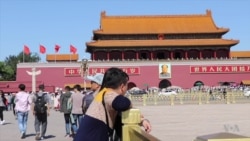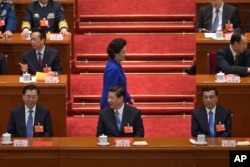China’s Communist Party holds its party congress and makes leadership changes once every five years.
The next congress takes place later this month. Many people will be watching those meetings to see who President Xi Jinping appoints to top political positions.
The party congress is a major event for the group that single-handedly rules the country. But China watchers say anyone following the meetings should not expect women to be given any major positions.
A number of other Asian nations have elected women as heads of state. But many observers say it remains almost impossible for Chinese women to make important decisions in their country’s political system. They say women remain underrepresented in China’s major policy-making agencies.
Women unfit to rule
The lack of trust in women in power may have its roots in Chinese history, says Chenni Xu, a member of the Beijing Women’s Network. She says the general public often notes the examples set by the three most powerful women in Chinese history. They are Empress Wu Zetian and Dowager Cixi and Jian Qing, wife of former Communist leader Mao Zedong.
“They’ll just point to those three and be like ‘well, see what happens when a woman gets in power? They drag the country down with them,’ Xu said.
Half of the sky?
When Mao Zedong led China, he famously declared that ‘Women hold up half the sky.’
Many Chinese remember the saying.
But Xu noted Mao’s call was more about doubling the country’s workforce than gender equality.
Years later, however, as women fill many top positions in private businesses, China’s Communist Party is still largely a group made up of men.
Vice Premier Liu Yandong is one of a few women at the top. Yet she is not a member of the decision-making Politburo’s Standing Committee. She is unlikely to move up in the leadership changes, observers say.
Women are responsible for less than 30 percent of the Communist Party’s membership, according to local media reports. There will be about 540 female delegates among the 2,300 delegates who attend the 19th National People’s Congress.
Observers say correcting the imbalance is important if the party wants to remain relevant, but the attention seems to be on other programs.
“The only achievement in the past couple of years is China’s (first) national law against domestic violence,” said Vaya Chen of the Shanghai Academy of Social Sciences.
“That shows a lot about the government’s emphasis on women’s family role and a harmonious society. But it shows how little the government has done to address women’s issues” at home, she added.
Women not in Xi’s program
President Xi Jinping had promised $10 million to UN Women, the United Nations’ Entity for Gender Equality and the Empowerment of Women.
The U.N. project hopes to build 100 health projects for women and children in developing countries.
“The (Chinese) government talks about increasing women’s political participation, but there haven’t been any concrete measures to support the initiatives,” Chen said. She urged the government to guarantee 30 percent of political leadership roles go to women.
Chenni Xu of the Women’s Network agrees with the 30 percent target.
She said Chinese women should be empowered and the barriers that deny equal treatment must be removed. But she does not think that change will come easily. She believes Chinese society puts pressure on women to stay with traditional paths.
No easy way to change
On the streets of Beijing, people say social and cultural barriers are to blame for the lack of balance. And they note many women have a lot of responsibility at home.
“There are a lot of women in civil services positions at the local level, but it is difficult for them,” a man named Liu told VOA. He added that women don’t have as much time as men to work their way up in the government.
In China, the retirement age for women is 55 years. That is five years younger than the retirement age for men because many women care for older adults or their grandchildren.
Some women VOA spoke with say they do not pay attention to politics. Others say politics is just too dirty and tricky – clear signs that women are losing interest in politics.
“Women seem to be less interested in politics,” said a woman who identified herself as Ms. Su.
“These days, she said, women are much more apolitical than they were before the 1980s…”
I’m Susan Shand.
William Ide and Joyce Huan reported this story for VOANews.com. Susan Shand adapted the report for Learning English. George Grow was the editor.
Write to us in the Comments Section or on our Facebook page.
______________________________________________________________
Words in This Story
gender – adj. the behavioral or cultural qualities normally linked with one sex
relevant - adj. more important, skillful, or successful than others
domestic - adj. relating to or involving someone's home or family
emphasis - n. a forceful quality in the way something is said or written
concrete – adj. of or related to a real thing, people or actions
initiative – n. a proposal or plan






